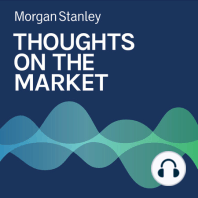4 min listen

Michael Zezas: Elections and Their Influence on Markets
Michael Zezas: Elections and Their Influence on Markets
ratings:
Length:
3 minutes
Released:
Jul 26, 2023
Format:
Podcast episode
Description
Investors are questioning what new policy changes the 2024 election might bring, how the changes could affect markets and when they should start paying attention.----- Transcript -----Welcome to Thoughts on the Market. I'm Michael Zezas, Global Head of Fixed-Income and Thematic Research for Morgan Stanley. Along with my colleagues bringing you a variety of perspectives, I'll be talking about what investors need to know about the 2024 U.S. election. It's Wednesday, July 26th at 11 a.m. in New York. As the press starts to focus more and more on the 2024 election, so have our clients leading many questions to come our way about who we think will be the next president and what we think they might do that could influence markets. As listeners of this podcast are surely aware, here at Morgan Stanley Research, we obviously care a great deal about elections and their consequences for markets. So then you might be surprised to know that our response so far to 2024 election questions has been, 'Nothing to see here, at least not yet'. There's two reasons behind this thinking. First, there's no data out there that can tell us much about what the election outcome will be. Polls are, in our view, better predictive tools and they've recently gotten credit for, but polls taken today about presidential candidates over a year away from the election have no track record of predicting anything. The same is true for polls about who the challenging party's nominee will be. And modern U.S. electoral history is full of examples where party nomination frontrunners have either faded or won the nomination, so there's no pattern to rely on there. In short, if you're interested in knowing who will win the election, there's not much to do but watch and wait. Second, the policy consequences of the election that might matter to markets could evolve greatly over the next 12 months in unpredictable ways. For example, in 2019, the 2020 election seemed set to be all about health care policy, and investors were intensely focused on the potential impact to the pharma sector. But when the pandemic hit, the election's importance to the market became more macro, it was all about the potential for more fiscal stimulus, shifting the election from an equity sector story to one that mattered to the overall stock index and bond yields. In 2007, the 2008 election seemed poised to be all about foreign policy, but then the financial crisis hit and markets again cared about how the outcome would affect potential fiscal stimulus and bank regulation. We could go on, but the point is this, history tells us this election will matter greatly to markets, but it's way too early to reliably know how it will matter. Now, rest assured, while we're suggesting investors don't have to pay close attention to the US election yet, we are paying attention and putting plenty of time into assessing the various plausible impacts the election could have. In particular around tax policy, tech regulation, defense spending, and refreshing our framework for how fiscal policy in the U.S. reacts to political conditions and party control in Congress. Of course, we'll flag for you when we think it's a productive time to join us in this early preparation, so that when the election and its consequences come more into focus, you'll be front footed. Thanks for listening. If you enjoy the show, please share Thoughts on the Market with a friend or colleague or leave us a review on Apple Podcasts. It helps more people find the show.
Released:
Jul 26, 2023
Format:
Podcast episode
Titles in the series (100)
Andrew Sheets: A Second (and Third) Opinion for Equity Markets by Thoughts on the Market